📁 Welcome to HanScan (한스캔)! A deep dive into Korea’s history—scandals, wars, cultural shifts & forgotten stories.📎 Who am I? Welsh writer, history nerd, part-time Korean resident. Studying Korea since 2010, fact-checking with my Korean S.O. (who swears I know more than him).🔍 Why HanScan? "Han" (Korea) + "Scan" (history & scandals). Think of it as a time machine through the past.🖥️ What’s Inside?📂 Scandals & Controversies – Political & celebrity drama📂 Wars & Tragedies – The moments that changed Korea📂 Cultural Shifts – Society through the years📂 Forgotten Stories – Hidden gems from history⌛ Stay tuned—unpacking the past, one scan at a time.
Don't wanna be here? Send us removal request.
Text
The Burning Sun Scandal: A Deep Dive Into South Korea's Clubbing Controversy
Written by HanTokki(한토끼)
Disclaimer, because my creative writing tutor would absolutely drum it into me: All the images here? Not mine, obvs. They belong to whoever they belong to. Just using 'em for context, no dody business intended.
Introduction 🔥
So, the Burning Sun Scandal. Honestly, it was one of the most jaw-dropping, stomach-churning things to come out of South Korea's entertainment world in ages. It's wasn't just a bit of celebrity gossip; it ripped open a whole nasty web of corruption, drug use (and not the fun kind, the truly awful kind), the police basically turning a blind eye, and proper, serious sexual crimes. All of it festering away in this one nightclub in Seoul. It properly blew up in late 2018, and before you knew it, it had dragged in K-pop idols, big shot business folks, coppers, and even government officals. The whole country was absolutely fuming, and rightly so.
And right at the rotten core of it? Seungri, you know, the ex-memebr of BIGBANG - a massive K-pop group. His dodgy connections to this club and all its illegal antics basically sent his whole career (and freedom, eventually) spiralling. But honestly, the scandal was so much bigger than just one famous face. It shone a brutal spotlight on some seriously deep-seated, grim issues in South's Korea nightlife, their law enforcement, and the entire entertainment machine.
This blog? It's just my attempt to lay out the facts as neutrally as I can, without my own brain going on too many wild tangents. We'll look at what happened, the main players, what the legal consequences were (or weren't, depending on who you ask), and how it's all affected South Korean society. Trying to keep it tidy, even though my mind's already wanting to jump ahead to all the implications!
1. What Was Burning Sun? 🏙️
Alright, so Burning Sun (버닝썬) itself was this swanky, high-end nightclub smack bang in the middle of Seoul's super posh Gangnam district. It was known for these ridiculously lavish parties, loads of celebrity sightings, and apparently, being the playground for the super-rich
According to all the flashy promo stuff, Burning Sun was all about the VIPS, foreign investors, and, yeah, the K-pop idols. But underneath all that sparkle and glam? It was absolutely rife with illegal stuff. We're talking:
✅ Drug distribution - and not just recreational stuff, but proper date rape drugs and all sorts of illegal substances. Just vile. ✅ Sexual exploitation & prostitution - which, again, is just abhorrent. ✅ Police bribery & collusion - the absolute betrayal of trust, honestly. ✅ Tax evasion & money laundering - because, why stop at just a few crimes when you can add a whole bunch more, eh?
"Burning Sun was not just a club—it was a hub of criminal activity protected by powerful figures." (Korean Investigative Report, 2019, translated from Korean)
The whole dreadful thing only really kicked off when one bloke got assualted, and it snowballed into this massive nationwide investigation that just kept unearthing layer after layer of pure, unadulterated corruption.
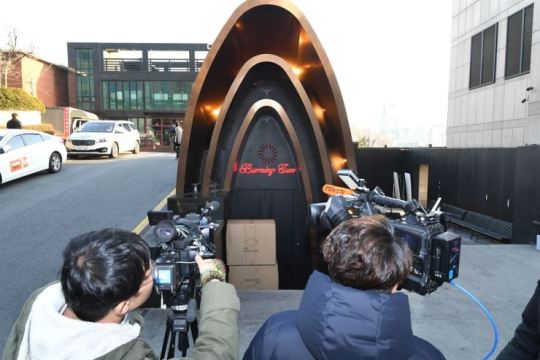
Caption: The entrance of the Burning Sun nightclub, looking all innocent and normal, but now thankfully permanetly shut down. Good riddance, honestly.
2. The Incident That Started It All 👊
This whole nightmare really hit the public consciousness in November 2018. There was this bloke, Kim Sang-kyo, and he got absolutely battered at Burning Sun. He said he was just trying to help a woman who was being harassed, but instead, the club's security laid into him, and then, insult to injury, the police actually arrested him. Unbelievable, isn't it?
Kim put it all out there on social media, and honestly, it just exploded. People were livid. He basically accused Burning Sun of:
Drugging women and filming them without any consent – which is just so, so wrong.
Offering up "sexual services" to their VIP clients.
And, the absolute kicker, having police officers basically on their payroll, doing their dirty work.
"The police protected the club instead of investigating it." (Kim Sang-kyo's public statement, 2019)
And his allegations? They set off an official investigation that just dug up so much more than anyone expected, all the grimy details coming to light.
3. Seungri & His Role in the Scandal 🎤
Right, so this was one of the truly shocking bits. Seungri, the BIGBANG member, was found to be properly mixed up with Burning Sun. I remember thinking, "No way, not him!" He tried to deny everything at first, obviously. But then, these leaked KakaoTalk messages came out, showing he was literally organising prostitution services for investors and VIPs at the club. Just rotten.
"Do everything you can to satisfy them. Give them the best girls." (Leaked KakaoTalk chat, 2015, translated from Korean)
These chats also laid bare that Seungri and his business pals were doing all sorts of other awful things:
Arranging for women to be drugged and sexually exploited.
Bribing the police to ignore all the illegal goings-on.
Using the club's ill-gotten gains for things like tax evasion.
In March 2019, Seungri, trying to save face I guess, said he was retiring from the entertainment industry, apparently to "protect BIGBANG's reputation." Too little, too late, mate. The investigations kept on going, leading to his eventual arrest and, rightly so, his imprisonment.
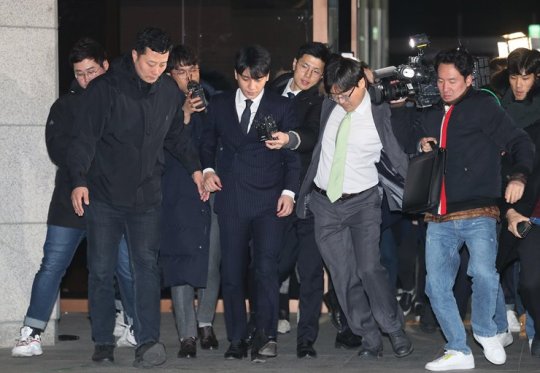
Caption: Seungri, looking a bit grim, leaving the court after getting grilled by the police. You reap what you sow, eh?
4. The Group Chat Scandal 📱
As if things couldn't get any worse, while they were investigating Seungri, the authorities stumbled upon another KakaoTalk chatroom. This one was even more sickening. It had multiple male celebrities in it, casually sharing illegal videos of unconscious women and literally discussing sexual exploitation. Just when you think you've heard it all, eh?
The group chat included:
The absolute scumbags in this group chat included:
Jung Joon-young – A singer who was caught filming and distributing explicit videos without consent. Utterly depraved.
Choi Jong-hoon – Used to be in FT Island, involved in the bribery and the sexual exploitation. Another one bites the dust.
And a whole load of other businessmen and nightclub execs were tangled up in it too.
"I filmed it, and they had no idea. LOL." (Jung Joon-young's leaked chat, 2016, translated from Korean)
This discovery just blew the scandal wide open, way beyond just Burning Sun, exposing this truly disgusting, entitled culture of abuse in the wider entertainment industry.
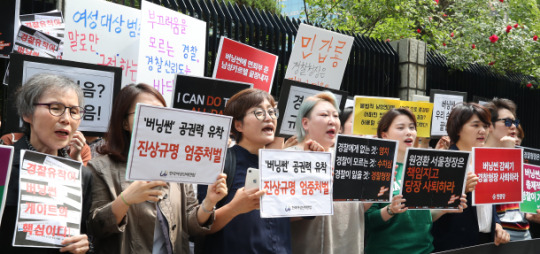
Caption: Protesters out in force, demanding justice for all the victims of the Burning Sun scandal. Good on them, honestly.
5. Police Corruption & Government Ties 🚔💰
And then there was the truly infuriating bit: the absolute stench of corruption wafting right through the South Korean police force. Burning Sun managed to operate for years because coppers were being bribed to conveniently ignore all the reports of illegal activities. It makes your blood boil, doesn't it?
The investigations revealed that:
Some police officers would actually warn the club before raids – tipping them off!
Bribes were being paid to actual high-ranking officials to cover up these horrendous crimes.
Loads of sexual assault cases at the club were just, well, ignored. Swept under the rug.
"The real problem isn’t just Burning Sun—it’s how deep police corruption goes." (Korea Anti-Corruption Journal, 2019, translated from Korean)
And despite everyone being absolutely outraged, only a handful of officers actually faced any real legal consequences. Makes you wonder if true justice was ever actually served, doesn't it?
6. Legal Consequences ⚖️
So, what actually happened to these dreadful people?
Seungri (BIGBANG): He was hit with charges for prostitution mediation, embezzlement, and illegal gambling. Ended up with 18 months in prison, and apparently got out in 2023. Honestly, felt a bit lenient for everything he was involved in.
Jung Joon-young: Got 5 years for all that disgusting filming and distributing of non-consensual sexual content.
Choi Jong-hoon (FT Island): Slapped with 2.5 years for sexual assault.
Even with these sentences, a lot of people (including my own constantly whirring brain) felt like the punishments just weren't harsh enough, considering the sheer depravity of the crimes committed.

Caption: The South Korean court, looking all official, where the main characters of this whole sorry saga were tried. Wish they'd got tougher sentences, personally.
7. Public Reaction & Social Impact 🌍
The Burning Sun Scandal wasn't just a fleeting news story; it properly shook things up. It led to:
Public Outrage – Massive protests, people demanding tougher laws on sex crimes and corruption. Good on them for standing up.
The #MeToo Movement really gained traction – encouraging more victims to bravely come forward with their own stories of abuse.
Actual Changes in Law – Supposedly harsher punishments for illegal filming and police corruption.
But, you know, some activists are still saying that real, fundamental change has been painfully slow. And, depressingly, similar abuse cases still pop up in the entertainment industry. It's a proper slow burn for proper change.
"Burning Sun was not an isolated case—it’s a symptom of deeper societal issues." (Women's Rights Group Korea, 2020)
8. Conclusion: A Scandal That Shook South Korea 🌏
So, there you have it. The Burning Sun Scandal. It really was so much more than just another celebrity meltdown. It ripped the lid off systemic problems that were rotting away in South Korean nightlife, their law enforcement, and their entertainment industry. While some bits of justice were served, you're left with this nagging feeling that the core issues – the deep-seated corruption and exploitation – are still festering away, unresolved.
Even now, years after the whole dreadful thing blew up, its shadow still looms large, shaping conversations about power, about abuse, and about whether anyone's really held accountable in South Korea. It's a lot to take in, isn't it? My brain's still doing somersaults trying to process it all.
References 📚
English Sources:
BBC News. (2019). South Korea’s K-Pop Scandal: What We Know So Far.
Reuters. (2020). Burning Sun Scandal: Corruption in South Korea’s Nightlife.
The Korea Herald. (2019). BIGBANG’s Seungri Quits Entertainment Amid Scandal.
The Guardian. (2020). Jung Joon-young Sentenced for Sex Crimes.
Amnesty International Korea. (2019). Sex Crimes and Police Corruption in South Korea.
Korean Sources (Translated into English):
Korean Investigative Report. (2019). Burning Sun and Organized Crime in Seoul.
Korea Anti-Corruption Journal. (2019). Bribery in the South Korean Police Force.
Seoul District Court. (2020). Judgment on the Burning Sun Scandal Defendants.
Other Sources
9. Lee, S. (2019). Police Set Up New Drug-Control Department. [Photograph]. Retrieved February 23, 2025, from https://www.koreatimes.co.kr/www/nation/2025/02/113_267903.html 10. Kim, J. (2019). Troubled K-pop Stars Released After Marathon Interrogation. [Photograph]. Retrieved February 23, 2025, from https://www.koreatimes.co.kr/www/art/2025/02/398_265461.html 11. Korea JoongAng Daily. (2019). Burning Sun Protest. [Photograph] Retrieved February 23, 2025, from https://koreajoongangdaily.joins.com/2019/05/17/socialAffairs/Burning-Sun-protest/3063210.html 12. Sanook. (2024). Burning Sun. [Photograph] Retrieved February 23, 2025, from https://www.sanook.com/news/9388338/
#burning sun scandal#burning sun#south korea#korean history#korean culture#HanScan#true crime#corruption#kpop#seungri#bigbang#jung joon young#choi jong hoon#police corruption#nightlife#gangnam#me too#social impact#scandal#investigation#Korean society#entertainment industry#journalism#investigative journalism#crime analysis#human rights#womens rights#educational content#learning something new#discussion
0 notes
Text
Crime in South Korea: A Neutral Analysis
Written by HanTokki(한토끼)
Disclaimer: All images belong to their respective owners. No copyright infringement intended
Introduction 🚔
South Korea is often portrayed as a safe and orderly nation, with low crime rates compared to other developed countries. However, like any society, it faces challenges related to crime, law enforcement, and social issues. While violent crime rates remain relatively low, cybercrime, white-collar crime, and organized crime have become growing concerns in recent years.
This blog takes a neutral approach to examining crime in South Korea, looking at statistics, trends, and responses from authorities while maintaining a balanced and fact-based perspective.
1. Crime Rates & General Safety 📊
South Korea consistently ranks as one of the safest countries in the world. According to the Numbeo Crime Index 2024, South Korea's crime index is lower than that of many Western countries.
"South Korea's overall crime rate remains low, with violent crime being rare compared to other developed nations." (World Crime Report, 2023)
According to a 2023 report by Statistics Korea (통계청):
The homicide rate in South Korea was 0.6 per 100,000 people, significantly lower than the U.S. (6.5) and even Japan (0.9).
The most common crimes were fraud, cybercrime, and theft, rather than violent offenses.
Sex crimes and domestic violence cases have seen an increase, particularly in urban areas.
Despite its reputation for safety, South Korea is not crime-free. Let's examine different types of crime in the country.
2. Violent Crime: Low but Not Nonexistent 🔪
South Korea has a relatively low rate of violent crime, such as murder and assault. However, high-profile cases occasionally make headlines and spark public concern.
One such case was the Shincheonji Church mass stabbing (2022), which shocked the nation. Though rare, incidents like these highlight underlying social issues, such as mental health and economic pressures.
"South Korea’s low violent crime rate is a testament to strong law enforcement, but isolated incidents still occur." (Korean National Police Agency, 2023, translated from Korean)
Domestic violence and gender-based violence have also been growing concerns. The #MeToo movement in South Korea has brought more attention to sexual violence cases that were previously underreported.

Caption: South Korean police officers patrolling a public area.
3. White-Collar Crime & Corruption 💼
White-collar crime, including corporate fraud, bribery, and embezzlement, has been a persistent issue in South Korea. The country has seen multiple high-profile corruption scandals involving politicians and business leaders.
One of the most well-known cases was the 2016 corruption scandal involving former President Park Geun-hye. The scandal led to her impeachment and imprisonment, exposing deep-rooted ties between politics and corporate interests.
"South Korea's rapid economic growth brought prosperity but also increased opportunities for corporate corruption." (Kang, 2021, Korean Business Ethics, translated from Korean)
The "chaebol" (재벌) system, where family-run conglomerates dominate the economy, has also been criticized for fostering an environment where corruption can thrive. Despite reforms, financial crimes remain a challenge.
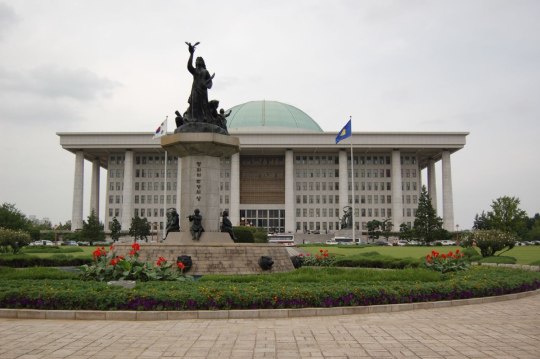
Caption: The National Assembly of South Korea, where anti-corruption laws are debated. (September 17, 2006)
4. Cybercrime: A Growing Concern 💻
With one of the world’s fastest internet speeds and a highly digital society, South Korea has seen a sharp rise in cybercrime. Common cyber offenses include:
Phishing scams and identity theft
Illegal online gambling
Hacking and data breaches
Online harassment and digital sex crimes
"South Korea's technological advancements have also led to new challenges in cybercrime prevention." (Seoul Cybercrime Unit, 2023, translated from Korean)
One of the most infamous cybercrime cases was the "Nth Room Scandal" (2020), in which criminals operated an online network that distributed illegal sexual content. The case sparked public outrage and led to stricter laws against digital sex crimes.

Caption: A hacker attempting to access sensitive data in cyberspace. (Nahel Abdul Hai, December 15, 2018)
5. Drug Crimes: A Strict Legal Approach 🚫
South Korea has some of the strictest drug laws in the world, with harsh penalties for possession, trafficking, and even drug use abroad.
"In South Korea, drug use is heavily stigmatized, and even celebrities caught using drugs face severe consequences." (Korea Drug Policy Institute, 2023)
Despite these laws, drug crimes have been increasing in recent years, particularly among younger generations. Reports indicate a rise in:
Methamphetamine (필로폰) use
Club drugs like MDMA and ketamine
Marijuana imports, despite being illegal
Authorities continue to crack down on drug-related crimes, but the rise in cases suggests shifting attitudes among some younger South Koreans.
6. Organized Crime & Gangs 🕵️
Though less visible than in countries like Japan or the U.S., organized crime groups (Kkangpae, 깡패) do exist in South Korea. They are involved in:
Illegal gambling operations
Loan sharking & money laundering
Nightclub and entertainment industry control
"While South Korean gangs operate more discreetly than in the past, they still hold influence in underground economies." (Lee, 2022, Organized Crime in Korea, translated from Korean)
Government crackdowns in recent years have pushed many gang activities online, leading to an increase in digital crime networks.
7. South Korea’s Legal & Law Enforcement Response ⚖️
The South Korean government has taken several measures to combat crime:
✅ Stricter Cybercrime Laws – The 2021 Digital Sexual Crimes Act increased penalties for online exploitation. ✅ Anti-Corruption Initiatives – The 2016 Kim Young-ran Act aimed to reduce bribery in politics and business. ✅ Stronger Domestic Violence Protections – Laws have been amended to provide better protections for victims.
Despite these efforts, critics argue that law enforcement still faces challenges in effectively prosecuting certain crimes, particularly those involving powerful individuals.
"South Korea has strong laws, but enforcement gaps remain in areas like sexual violence and corporate crime." (Amnesty International Korea, 2023)
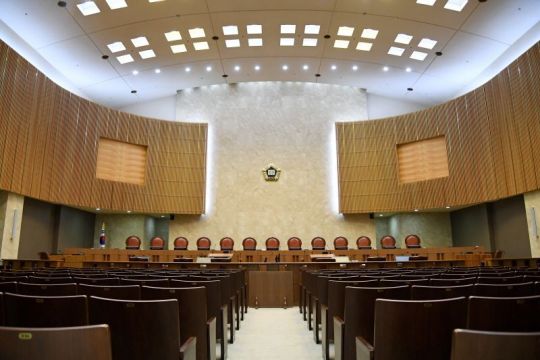
Caption: A South Korean court, where major criminal cases are decided.
8. Conclusion: A Safe Country with Evolving Challenges 🌏
South Korea remains one of the safest countries in the world, with low violent crime rates and strong law enforcement. However, the rise of cybercrime, white-collar crime, and digital offenses presents new challenges.
The country’s strict laws on drugs and organized crime continue to maintain order, but evolving societal issues—such as economic inequality and online crime—may require further reforms. As South Korea moves forward, balancing security, justice, and civil liberties will be key in shaping its crime policies.
References 📚
English Sources:
World Crime Report. (2023). Crime Statistics by Country. Oxford University Press.
Amnesty International Korea. (2023). Human Rights and Law Enforcement in South Korea.
Kang, H. (2021). Korean Business Ethics and Corruption. HarperCollins.
Korea Drug Policy Institute. (2023). South Korea’s Drug Laws and Enforcement.
Numbeo. (2024). Crime Index by Country. www.numbeo.com
Korean Sources (Translated into English):
Statistics Korea. (2023). Annual Crime Report. Seoul: SK Publications.
Korean National Police Agency. (2023). Crime Prevention Strategies.
Seoul Cybercrime Unit. (2023). Cybercrime and Digital Threats in Korea.
Lee, J. (2022). Organized Crime in Korea. Seoul: Mirae Books.
National Assembly of Korea. (2023). Recent Legal Reforms on Crime.
Additional Online References:
BBC News. (2023). Cybercrime Trends in South Korea.
Reuters. (2023). South Korea’s Response to White-Collar Crime.
Statista. (2024). Crime Rates in South Korea by Type.
The Korea Herald. (2023). Rising Drug Crimes Among Youth in South Korea.
The New York Times. (2023). Organized Crime in East Asia.
Kustom Signals. (n.d.). How South Korea's K-Cops are helping in the fight against international crime [Photograph]. Retrieved February 23, 2025 from https://kustomsignals.com/blog/how-south-koreas-k-cops-are-helping-in-the-fight-against-international-crim
Wikipedia contributors. (n.d.). Seoul-National Assembly-02 [Photograph]. Wikipedia, The Free Encyclopedia. Retrieved February 23, 2025, from https://en.wikipedia.org/wiki/File:Seoul-National.Assembly-02.jpg
Nahel Abdul Hadi. (2018). Person Wearing Mask [Photograph]. Unsplash. Retrieved February 23, 2025
The Blue Roof. (2021). Introduction to South Korea's Judicial System. [Photograph]. Retrieved February 23, 2025, from https://www.blueroofpolitics.com/post/introduction-to-south-koreas-judicial-system/
#crime#true crime#crime analysis#law and order#criminal justica#crime statistics#cybercrime#white collar crime#organized crime#law enforcement#south korea#korea news#korean society#korean politics#korea law#seoul#cybersecurity#hacking#digital crime#online scams#data breach#true crime community#crime documentary#crime studies#current events#investigative journalism#crime awareness#studyblr#journalism#critical thinking
0 notes
Text
South Korea: A Modern Nation with Deep Roots
Written by HanTokki (한토끼)
Disclaimer: All images belong to their respective owners. No copyright infringement intended.
Introduction 🏙️
South Korea, officially known as the Republic of Korea (ROK), is a nation in East Asia with a rich history, a dynamic modern society, and a strong global presence. From its rapid economic growth—often referred to as the "Miracle on the Han River"—to its deep-rooted cultural traditions, South Korea stands as a fascinating country where old meets new. This blog will explore various aspects of South Korea, including its history, culture, economy, and global influence.
1. Historical Background 📜
South Korea’s history dates back thousands of years, with its origins in ancient kingdoms such as Goguryeo, Baekje, and Silla. The Joseon Dynasty (1392–1897) was one of its most significant periods, shaping much of Korea’s modern cultural identity.
Following Japanese colonization (1910–1945) and the Korean War (1950–1953), South Korea emerged as an independent nation, separate from North Korea. The war resulted in the division of the Korean Peninsula along the 38th parallel, a separation that remains to this day.
"The Korean War left deep scars on the peninsula, but it also set the stage for South Korea’s rapid modernization." (Smith, 2019, A Brief History of Korea)
Despite the challenges, South Korea transformed into a major global economy, particularly from the 1960s onwards.
2. Economic Growth & Innovation 💰
South Korea’s economy ranks among the top in the world, driven by technological advancements, exports, and global corporations like Samsung, Hyundai, and LG. The country’s economic rise is often compared to Japan’s, with both nations experiencing post-war booms.
"South Korea's development strategy focused on heavy industries and exports, leading to its status as an economic powerhouse." (Korean Economic Research Institute, 2021, translated from Korean)
The nation is also home to a thriving startup scene and is a leader in fields like robotics, artificial intelligence, and green energy. Seoul, the capital, is considered one of the most technologically advanced cities globally.

Caption: A view of Seoul’s skyline, showcasing its blend of modern skyscrapers and historical sites. (Ping Onganankun, July 27, 2018)
3. Korean Culture: A Global Phenomenon 🌏
K-pop & Entertainment 🎵
South Korean pop culture, known as the “Korean Wave” (Hallyu), has gained massive global influence through K-pop, dramas, and films. Groups like BTS and BLACKPINK have taken over international music charts, while films like Parasite (2019) have won prestigious awards.
"The rise of K-pop is not just about music; it represents a broader shift in global pop culture." (Johnson, 2022, The K-Wave Effect)
K-dramas such as Squid Game (2021) have further solidified South Korea’s presence in global entertainment, reflecting both social commentary and storytelling expertise.
Traditional Culture & Heritage 🎎
Despite modernization, South Korea preserves its traditional customs. Hanbok (한복, traditional clothing), Confucian values, and ancestral rites remain important in Korean society.
Temples such as Bulguksa (불국사) and palaces like Gyeongbokgung (경복궁) attract millions of visitors each year, providing a glimpse into the nation’s past.
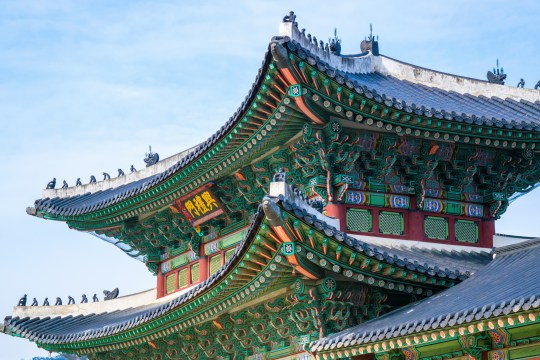
Caption: Gyeongbokgung Palace, a historical landmark in Seoul, South Korea. (Brady Bellini, Novemebr 26, 2015)
4. Society & Daily Life 🏠
Education & Work Culture 📚
South Korea is known for its rigorous education system, often ranked among the best in the world. Students face high academic pressure, with many attending hagwons (학원, private academies) after school.
"The South Korean education system is demanding, but it has contributed to the nation's skilled workforce." (Korea Education Journal, 2020, translated from Korean)
Work culture in South Korea is also intense, with long hours and hierarchical corporate structures. However, recent years have seen efforts to improve work-life balance.
Food & Cuisine 🍜
Korean cuisine is famous worldwide, with dishes like kimchi (김치), bibimbap (비빔밥), and Korean BBQ (삼겹살). Street food, such as tteokbokki (떡볶이, spicy rice cakes) and hotteok (호떡, sweet pancakes), is also a popular part of daily life.
"Korean food is not just about taste—it carries cultural significance and a deep connection to history." (Lee, 2021, Korean Culinary Heritage)

Caption: A table filled with Korean dishes, showcasing the variety of flavors and colors. (Marcin Skalij, October 27, 2021)
5. Geopolitics & International Relations 🌏
South Korea plays a significant role in global diplomacy, maintaining strong alliances with countries like the United States while navigating complex relations with North Korea. The Korean Peninsula remains a key focus of international security discussions.
The Demilitarized Zone (DMZ) acts as a buffer between North and South Korea, with occasional diplomatic efforts to improve relations. Despite tensions, South Korea has sought peaceful solutions through summits and cultural exchanges.
"The Korean Peninsula remains one of the most sensitive geopolitical regions in the world." (Park, 2023, Korea’s Role in Global Politics, translated from Korean)
6. Future Outlook 🚀
South Korea continues to evolve, facing challenges such as an aging population, economic shifts, and climate concerns. However, its advancements in technology, global influence, and cultural soft power suggest a strong future ahead.
"South Korea’s ability to adapt to change has been key to its success, and this trend is likely to continue." (Kim, 2024, South Korea in the 21st Century, translated from Korean)
From AI-driven smart cities to green technology, South Korea is positioning itself as a leader in the future global economy.
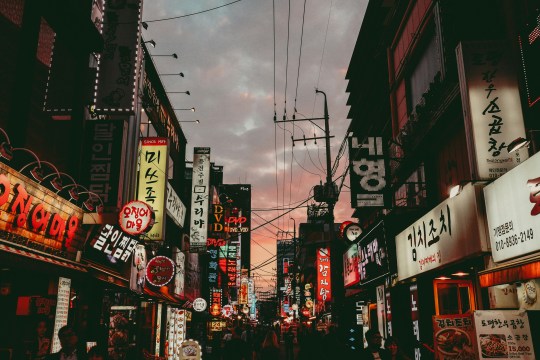
Caption: A futuristic view of Seoul, representing South Korea’s vision for the future. (Sava Bobov, January 28, 2018)
Conclusion 🌏
South Korea is a nation of contrasts—where tradition meets modernity, and rapid progress coexists with deep historical roots. Its global impact in entertainment, technology, and economy makes it a key player in the 21st century. Whether through K-pop, cutting-edge innovations, or historical sites, South Korea continues to shape the world in unique ways.
References 📚
English Sources:
Smith, J. (2019). A Brief History of Korea. Oxford University Press.
Johnson, M. (2022). The K-Wave Effect: How Korea Took Over Global Pop Culture. HarperCollins.
Park, H. (2023). Korea’s Role in Global Politics. Cambridge University Press.
Lee, S. (2021). Korean Culinary Heritage. Routledge.
Kim, T. (2024). South Korea in the 21st Century. Penguin Books.
Korean Sources (Translated into English):
Korean Economic Research Institute. (2021). South Korea’s Economic Growth Report. Seoul: KERI.
Korea Education Journal. (2020). Education and Academic Pressures in Korea. Seoul: KEJ.
Park, Y. (2023). Geopolitics of the Korean Peninsula. Seoul: Hanul Books.
Kim, J. (2022). Technology and AI in South Korea’s Future. Busan: Mirae Publishing.
Lee, D. (2021). Tradition and Modernity in Korean Society. Seoul: Hanguk Culture Press.
Additional Online References:
World Bank (2023). South Korea Economic Data. www.worldbank.org
UNESCO (2022). Korean Heritage Sites. www.unesco.org
BBC News (2023). South Korea’s Role in Global Affairs. www.bbc.com
Statista (2024). K-pop Industry Revenue Statistics. www.statista.com
Reuters (2024). South Korea’s Climate Initiatives. www.reuters.com
Ping Onganankun, "Ariel View of Building During Nighttime". Unsplash, 2018 https://unsplash.com/photos/areal-view-of-building-during-nighttime-5htrsUUbFGI
Brady Bellini, "Green and Red Temple". Unsplash, 2015 https://unsplash.com/photos/green-and-red-temple-t5dGNNQVwg8
Marcin Skalij, "A Bowl of Food with a Spoon In It". Unsplash, 2021 https://unsplash.com/photos/a-bowl-of-food-with-a-spoon-in-it-w_2vlvTgk7E
Sava Bobov, "City Under Cloudy Sky". Unsplash, 2018 https://unsplash.com/photos/city-under-cloudy-sky-eVa2FK83K6w
#south korea#korean culture#k-pop#k-drama#korean food#seoul#korean travel#korean history#Korean economy#hallyu#bts#blackpink#squid game#parasite#south korea technology#smart cities#samsung#Korean heritage#korean aesthetic#studyblr
1 note
·
View note
Text
📁 About_HanScan.exe – Loading Korea’s Past…
🖥️ Welcome to HanScan (한스캔) – your deep dive into Korea’s history. From scandals and celebrity controversies to wars, tragedies, and cultural shifts, this blog scans the past—one file at a time.
📎 Who am I? 📂 User: Welsh writer, history nerd, media geek. 📂 Experience: Studying Korea since 2010, part-time Korean resident, obsessive fact-checker. 📂 Fun Fact: My Korean S.O. says I know more history than him (he’s not wrong).
🔍 Why HanScan? "Han" (Korea) + "Scan" (history & scandals) = A retro archive of forgotten stories.
📁 File Directory: 📂 Scandals.exe – Political & celebrity drama 📂 Wars.sys – Conflicts that shaped Korea 📂 Culture.dll – Society through the years 📂 Forgotten.pst – Lost & hidden history
⌛ Stay tuned—processing historical data...
📎 Click OK to continue.

#korean history#history blog#windows95#reto internet#histblr#cultural analysis#public figures#nostalgia core#media literacy#open discussion#studyblr#tumblr text post#history enthusiasts#historical deep dive
1 note
·
View note
Text
⚠️ Disclaimer.exe – A Little Heads-Up Before You Dive In!
📁 Okay, so, HanScan - that's what this blog's called, right? It's basically my luttle corner of the internet where I'm trying to stash all the cool stuff I dig up about Korean history and culture. Think of it like a digital attic, but with way less dust and more fascinating facts.
🖥️ Now, because my mind really likes to go off on tangents, I've tried to keep this bit super straightforward. The whole point of HanScan is to be, like, a proper archive. We're talking well-research chats about all sorts of Korean bits and bobs - the history, the culture, the famous faces. I've really, really tried to make sure it's accurate, but history's a tircky beast, isn't it? It's all about who's telling the story, what they reckon happened, and all the debates and guesswork around it.
🔍 Keeping It Neutral (As Much As My Brain Allows!)
And look, I'm not trying to push any particular viewpoint here. My head's already buzzing with enough opinions of its own! HanScan is just about chucking out different ideas and perspectives, so we can all have a good chinwag about them. If something I've written makes you go, "Hold on a minute!" then honestly, that's absolutely fine. It's good to have your own thoughts challenged sometimes, makes things more interesting, doesn't it?
Everything you read here is from stuff that's already out there in the public domain. I'm not trying to stitch anyone up, or make anyone look bad, or twist things. It's just me, trying to piece together information from publicly available sources.
❌ Let's Keep It Respectful, Yeah?
Right, last thing: no glitches allowed! My brain's already chaotic enough without adding more drama. If you disagree with something, cool, let's talk about it. But no doxxing, no nasty attacks, and definitely no making up false accusations. That's just not on. Let's keep this a proper, respectful place for discussion, alright?
✅ So, if all that sounds good, then click OK to continue! And please, just be curious and respectful. My brain will thank you for it!
📎 Click OK to continue.

#Korean history#korean culture#HanScan#history blog#culture blog#educational content#east Asian history#asian culture#historical facts#cultural insights#learning something new#discussion
2 notes
·
View notes